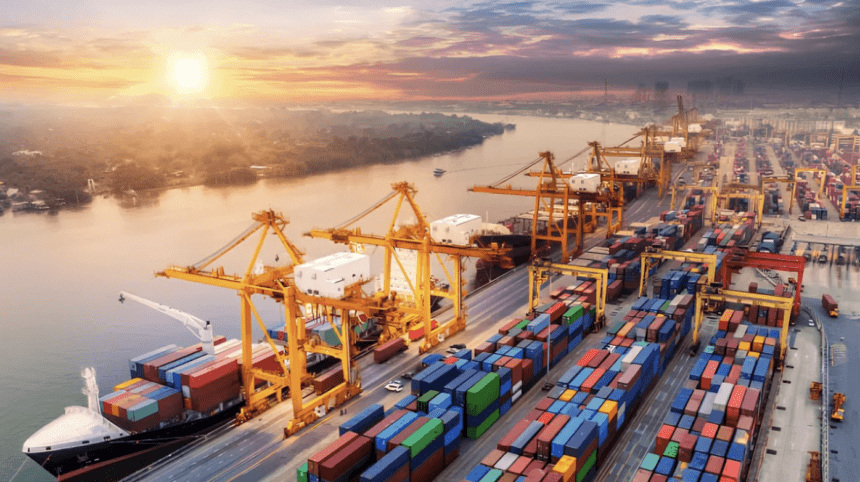The Turkish logistics sector will have a difficult year in 2024. Companies investing in technology and digitalization are expected to survive this year with fewer losses.
While global freight indices indicate a deepening contraction in international transportation, 2024 is expected to be much more difficult for the Turkish logistics industry. Companies that increase their operational efficiency by investing in technology and digitalization are expected to survive next year with fewer losses.
The logistics sector, which gained momentum all over the world and witnessed historic profitability with the pandemic, entered a contraction trend due to the slowdown in the global economy. While global freight indices indicate that the contraction in the sector has deepened, 2024 is expected to be much more difficult for the Turkish international transportation sector. On the one hand, Turkish logistics companies, whose operating expenses have rapidly increased in parallel with the developments in the local economy, are experiencing major losses in their profitability in parallel with the decline in global freight transportation demand. It is becoming increasingly difficult to survive, especially for medium-sized companies.
Drewry’s World Composite Container Index, which is one of the most important indicators of international transportation and evaluates the maritime container freight market, started to decline again after a brief one-week increase as shipowners cut ship supply. The Drewry World Composite Container Index, which hit USD 1,500 in the week of November 9, fell to USD 1,384 in the last data released on November 23. Thus, the index fell 46 percent compared to the same period last year.
At USD 1,384 per 40 ft. container, the index is 3 percent lower than the average rate of USD 1,420 in 2019, before the pandemic. While global experts do not expect a recovery in the freight market before 2025, there are also those who say that in the worst case scenario, this situation could last until 2028. While the falling freight caused an annual loss of more than 70 percent in the profitability of giant container companies in the third quarter of the year, container ship prices also started to decline rapidly. In the last two months alone, ship prices have fallen by 20 percent.
First contraction in ports in 5 years
In parallel with the slowdown in the global economy, the amount of cargo handled at Turkish ports is also in decline. In October 2023, the amount of cargo handled at ports decreased by 3.5 percent compared to the same month of the previous year and reached 44 million 282 thousand 189 tons. In October, foreign trade transportation decreased by 1.5 percent compared to the same month of the previous year and reached 33 million 718 thousand 870 tons. In January-October period of 2023, the amount of cargo handled at ports decreased by 4.1 percent compared to the same period of the previous year and reached 436 million 89 thousand 462 tons. Aydın Erdemir, President of TÜRKLİM, Port Operators Association of Turkey, states that an annual contraction in total cargo handled at Turkish ports is inevitable by the end of 2023. The last decline in total cargo handled at Turkish ports was in 2018.
Export truck trips in decline as well
Export truck trips in road transportation also entered a shrinking trend. According to the data of the International Freight Forwarders Association (UND), export truck trips by road from Turkey in the January-October 2023 period decreased by approximately 3 percent compared to the same period of the previous year and amounted to 1 million 660 thousand 720 trips.
Green transformation is a must for the European market
One of the important agendas of 2024 in the logistics sector will be the Carbon Tax at the Border and the EU’s Green Deal. Ayşem Ulusoy, Chairman of the Board of Directors of the International Transportation and Logistics Service Providers Association (UTİKAD), stated that Turkish companies should focus on investments that will reduce carbon emissions in order to maintain their global competitiveness, otherwise it is inevitable that many companies will suffer losses, especially in Europe, the most important export market.
Ulusoy listed the steps to be taken in Turkey in this regard as follows:
Investing in environmentally friendly technologies,
Encouraging investments in environmentally friendly technology,
Shift from road transport to railways,
Increasing the use of environmentally friendly (electric) vehicles in road transportation,
Promoting intermodal transportation,
Establishment of railway connections of ports,
Digitalization.
10 urgent needs for global competitiveness in logistics
Supporting environmentally friendly modes of transport such as rail
Providing rail connections at ports
Providing the private sector with equal competition conditions with TCDD in railway transportation and encouraging locomotive investments
Encouraging green and technological investments
Making legislative arrangements to accelerate the development of e-export logistics
Providing sector-specific financing support
Expanding the scope of fair incentives
Solving border crossing problems, quota and visa problems on the highway
Facilitating and accelerating customs processes
Increasing the age limit for truck drivers to reduce the shortage of drivers.










